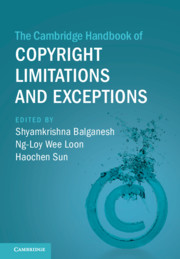Book contents
- The Cambridge Handbook of Copyright Limitations and Exceptions
- The Cambridge Handbook of Copyright Limitations and Exceptions
- Copyright page
- Contents
- Contributors
- Preface
- Part I The Theoretical Foundation of Copyright Limitations
- Part II Internationalizing Copyright Exceptions
- Part III Models of Copyright Exceptions
- 7 Debunking the Fair Use vs. Fair Dealing Myth: Have We Had Fair Use All Along?
- 8 Fair Use As an Advance on Fair Dealing? Depolarizing the Debate
- 9 The Changing Judicial Politics of Copyright Exceptions in the UK
- 10 “Fair Use” through Fundamental Rights in Europe: When Freedom of Artistic Expression Allows Creative Appropriations and Opens Up Statutory Copyright Limitations
- 11 Limitations and Exceptions in Copyright Law across the Taiwan Strait
- 12 A General Clause on Copyright Limitations in Civil Law Countries: Recent Discussion on Japanese-Style Fair Use Clause
- 13 Bridging Fair Dealing and Fair Use Concepts: Malaysia’s Transition to a Hybrid System
- Part IV Obvious and Hidden Values in the Working of Copyright Exceptions
- Part V Copyright Exceptions and Technology
8 - Fair Use As an Advance on Fair Dealing? Depolarizing the Debate
from Part III - Models of Copyright Exceptions
Published online by Cambridge University Press: 15 January 2021
- The Cambridge Handbook of Copyright Limitations and Exceptions
- The Cambridge Handbook of Copyright Limitations and Exceptions
- Copyright page
- Contents
- Contributors
- Preface
- Part I The Theoretical Foundation of Copyright Limitations
- Part II Internationalizing Copyright Exceptions
- Part III Models of Copyright Exceptions
- 7 Debunking the Fair Use vs. Fair Dealing Myth: Have We Had Fair Use All Along?
- 8 Fair Use As an Advance on Fair Dealing? Depolarizing the Debate
- 9 The Changing Judicial Politics of Copyright Exceptions in the UK
- 10 “Fair Use” through Fundamental Rights in Europe: When Freedom of Artistic Expression Allows Creative Appropriations and Opens Up Statutory Copyright Limitations
- 11 Limitations and Exceptions in Copyright Law across the Taiwan Strait
- 12 A General Clause on Copyright Limitations in Civil Law Countries: Recent Discussion on Japanese-Style Fair Use Clause
- 13 Bridging Fair Dealing and Fair Use Concepts: Malaysia’s Transition to a Hybrid System
- Part IV Obvious and Hidden Values in the Working of Copyright Exceptions
- Part V Copyright Exceptions and Technology
Summary
Over the last dozen or so years, countries with laws based on the Copyright Act 1911 (UK) have prioritized the issue of copyright exceptions in their law reform agendas. In each of these countries, a central question has related to the desirability of injecting greater flexibility into exceptions, most notably through the introduction of a “fair use” provision in addition to, or perhaps replacing much of, the existing closed-list system. The resulting statutory reforms have varied. Sri Lanka and Israel, for example, have both adopted a US-style fair use defense, along with a small number of specific exceptions, in their new copyright laws of 2003 and 2007. Singapore has also enacted an open-ended provision, albeit in the form of extended fair dealing rather than fair use. This was achieved by amending one of the purpose-limited fair dealing exceptions to allow it to apply to (almost) any use, with the many closed-list exceptions otherwise retained. In contrast, the reforms of Canada and the UK have – in terms of drafting choices – stayed closer to the existing infrastructure, with the addition of new fair dealing purposes directed to education, parody, and (in the UK) caricature, pastiche and quotation, and the introduction of new detailed exceptions to accommodate specific practices such as user-generated content, private copying, and data mining. The Australian reform experience has been less fruitful. After some expansion of exceptions (albeit within the closed-list model) in 2006, an impasse arose following strong calls for fair use from two major law reform inquiries. Despite the level of attention already given to copyright exceptions, the Australian government initiated yet another round of consultation in relation to reform options in 2018. There may finally be some progress, as the Australian government announced in August 2020 that it intends to make a series of reforms to the Australian copyright statute, including a new fair dealing exception for non-commercial quotation, a limitation on liability for use of orphaned works, and reforms to certain specific exceptions.
- Type
- Chapter
- Information
- The Cambridge Handbook of Copyright Limitations and Exceptions , pp. 140 - 157Publisher: Cambridge University PressPrint publication year: 2021

